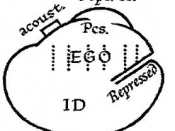Freud and Jack
The novel Lord of the Flies by William Golding is about a group of boys who are stranded on an island. As the plot grows, the boys grow farther and farther away from their civilized upbringing. Their personalities change, but not in a clearly obvious way. Sigmund Freud, an esteemed psychologist, developed a breakdown of the human personality. It was and is made up of three levels: the id, the ego, and the superego. The characters in this book change on those levels. Once character in particular is Jack. He is introduced as a civilized, upstanding, British child; but concludes as a savage leader of the primitive society on the island. Not only do the Freudian personality levels of Jack change throughout the book, but also the decrease of intensity in the ego and superego result in an intensified id.
Jack's "id," or the first trait of the Freudian personality, becomes this character's dominating characteristic by the end of the book.
An id, by definition is "the division of the psyche associated with instinctual impulses and the satisfaction of primitive needs." The id obeys the pleasure principle, which purpose is to rid a person of tension, or at least lower that tension level ad keep it as constant as possible. Tension is discomfort of pain, for instance: hunger. If one experiences hunger, then the id does what I can to relieve such hunger. In cases where the tension is a dry eye, the body learns to blink, thus developing a reflex. But in the case of hunger it is different. The stomach, although irritated without food, cannot produce the food it wants. So the id tells the body to do what it can, whether it is throwing an emotional fit until fed, or getting up and...


